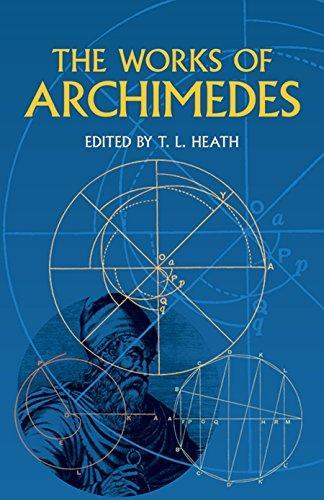Archimedes of Syracuse (; Ancient Greek: Ἀρχιμήδης; Doric Greek: [ar.kʰi.mɛː.dɛ̂ːs]; c. 287 – c. 212 BC) was a Greek mathematician, physicist, engineer, astronomer, and inventor from the ancient city of Syracuse in Sicily. Although few details of his life are known, he is regarded as one of the leading scientists in classical antiquity. Considered to be the greatest mathematician of ancient history, and one of the greatest of all time, Archimedes anticipated modern calculus and analysis by applying the concept of the infinitely small and the method of exhaustion to derive and rigorously prove a range of geometrical theorems, including: the area of a circle; the surface area and volume of a sphere; area of an ellipse; the area under a parabola; the volume of a segment of a paraboloid of revolution; the volume of a segment of a hyperboloid of revolution; and the area of a spiral.Archimedes' other mathematical achievements include deriving an approximation of pi; defining and investigating the spiral that now bears his name; and devising a system using exponentiation for expressing very large numbers. He was also one of the first to apply mathematics to physical phenomena, founding hydrostatics and statics. Archimedes' achievements in this area …
Archimedes
Author details
- Born:
- Nov. 11, 287
- Died:
- Nov. 11, 212
External links
Archimedes of Syracuse (; Ancient Greek: Ἀρχιμήδης; Doric Greek: [ar.kʰi.mɛː.dɛ̂ːs]; c. 287 – c. 212 BC) was a Greek mathematician, physicist, engineer, astronomer, and inventor from the ancient city of Syracuse in Sicily. Although few details of his life are known, he is regarded as one of the leading scientists in classical antiquity. Considered to be the greatest mathematician of ancient history, and one of the greatest of all time, Archimedes anticipated modern calculus and analysis by applying the concept of the infinitely small and the method of exhaustion to derive and rigorously prove a range of geometrical theorems, including: the area of a circle; the surface area and volume of a sphere; area of an ellipse; the area under a parabola; the volume of a segment of a paraboloid of revolution; the volume of a segment of a hyperboloid of revolution; and the area of a spiral.Archimedes' other mathematical achievements include deriving an approximation of pi; defining and investigating the spiral that now bears his name; and devising a system using exponentiation for expressing very large numbers. He was also one of the first to apply mathematics to physical phenomena, founding hydrostatics and statics. Archimedes' achievements in this area include a proof of the principle of the lever, the widespread use of the concept of center of gravity, and the enunciation of the law of buoyancy. He is also credited with designing innovative machines, such as his screw pump, compound pulleys, and defensive war machines to protect his native Syracuse from invasion. Archimedes died during the siege of Syracuse, when he was killed by a Roman soldier despite orders that he should not be harmed. Cicero describes visiting Archimedes' tomb, which was surmounted by a sphere and a cylinder, which Archimedes had requested be placed on his tomb to represent his mathematical discoveries. Unlike his inventions, Archimedes' mathematical writings were little known in antiquity. Mathematicians from Alexandria read and quoted him, but the first comprehensive compilation was not made until c. 530 AD by Isidore of Miletus in Byzantine Constantinople, while commentaries on the works of Archimedes by Eutocius in the 6th century opened them to wider readership for the first time. The relatively few copies of Archimedes' written work that survived through the Middle Ages were an influential source of ideas for scientists during the Renaissance and again in the 17th century, while the discovery in 1906 of previously lost works by Archimedes in the Archimedes Palimpsest has provided new insights into how he obtained mathematical results.
